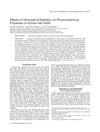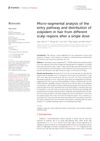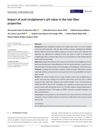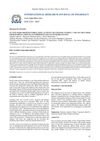 January 2017 in “Journal of Cosmetics, Dermatological Sciences and Applications”
January 2017 in “Journal of Cosmetics, Dermatological Sciences and Applications” Chinese women's hair gets thinner and grayer with age, and scalp conditions change, especially after 40.
 May 2017 in “Journal of microscopy and ultrastructure”
May 2017 in “Journal of microscopy and ultrastructure” Water quality affects mineral content in hair, and coconut oil can protect against damage.
1 citations,
January 2018 in “Journal of microscopy and ultrastructure” The method can identify minerals in hair from water, and using coconut oil or conditioner can prevent mineral buildup.
 December 2023 in “Gugje bogeon mi-yong haghoeji”
December 2023 in “Gugje bogeon mi-yong haghoeji” Scalp scaling with aroma oil improves scalp condition and user satisfaction.
 52 citations,
December 2000 in “Archives of Dermatological Research”
52 citations,
December 2000 in “Archives of Dermatological Research” Scalp skin barrier affects hair loss; personalized treatments needed.
12 citations,
May 2021 in “Clinical Interventions in Aging” Men with androgenetic alopecia have oilier and less hydrated scalps, especially in sensitive areas.
 5 citations,
March 2012 in “Microscopy Research and Technique”
5 citations,
March 2012 in “Microscopy Research and Technique” UVB radiation changes the chemical makeup and dries out human hair but doesn't alter its appearance or texture.
 44 citations,
July 2011 in “Dermato-endocrinology”
44 citations,
July 2011 in “Dermato-endocrinology” Thyroid hormone affects skin health, with too little causing rough, pale skin and too much leading to smooth, thin skin, and may also impact wound healing and skin conditions.
 April 2020 in “Dermatology and therapy”
April 2020 in “Dermatology and therapy” New 5% minoxidil solution improves scalp hydration, reduces redness, and may be safer for sensitive users.
 1 citations,
January 2022 in “Journal of Pharmaceutical Sciences”
1 citations,
January 2022 in “Journal of Pharmaceutical Sciences” The new skin cream with FOL-005 safely promotes hair growth and is stable and user-friendly.
11 citations,
April 2022 in “Biophysical Journal” Disulfide bonds in keratin fibers break more easily under stress, especially when wet, affecting fiber strength.
 September 2024 in “Heliyon”
September 2024 in “Heliyon” Repeated hair dyeing significantly damages hair.
 5 citations,
May 2021 in “International Journal of Cosmetic Science”
5 citations,
May 2021 in “International Journal of Cosmetic Science” Healthy scalp leads to better hair quality and less damage.
 32 citations,
August 2015 in “Anais Brasileiros de Dermatologia”
32 citations,
August 2015 in “Anais Brasileiros de Dermatologia” Black women's unique hair characteristics and styling practices can lead to specific scalp conditions, which require early diagnosis and appropriate treatment.
 May 2023 in “Frontiers in chemistry”
May 2023 in “Frontiers in chemistry” Zolpidem shows up in hair from the top back of the head after one dose and fades over time, suggesting it gets into hair through blood and sweat.
 193 citations,
January 2015 in “International journal of trichology”
193 citations,
January 2015 in “International journal of trichology” Dermatologists need to understand hair products to treat hair and scalp issues better.
 13 citations,
January 2010 in “Advances in Biochemical Engineering / Biotechnology”
13 citations,
January 2010 in “Advances in Biochemical Engineering / Biotechnology” Understanding hair biology is key to developing better treatments for hair and scalp issues.
 September 2014 in “Springer eBooks”
September 2014 in “Springer eBooks” Men and women experience skin aging differently due to changes in sex hormone levels with age.
 2 citations,
January 2000 in “Elsevier eBooks”
2 citations,
January 2000 in “Elsevier eBooks” The document explains how hair is studied in forensics to identify its source and its role in criminal investigations.

The herbal shampoo effectively reduces dandruff and hair fall.
 8 citations,
November 2022 in “International Journal of Cosmetic Science”
8 citations,
November 2022 in “International Journal of Cosmetic Science” Human hair varies widely and should be classified by curl type rather than race.
 3 citations,
June 2019 in “Journal of cosmetic dermatology”
3 citations,
June 2019 in “Journal of cosmetic dermatology” Lower pH straighteners change hair more but weaken it.
 1 citations,
October 2018 in “International research journal of pharmacy”
1 citations,
October 2018 in “International research journal of pharmacy” Rampai leaves extract can significantly stimulate hair growth.
A hat with sensors can measure scalp moisture well, helping with hair care.
 73 citations,
July 2016 in “Cosmetics”
73 citations,
July 2016 in “Cosmetics” Mushrooms have beneficial properties for skin and hair care products and have great potential for future cosmetic use.
40 citations,
January 2018 in “International journal of trichology” Healthy scalp reduces hair loss by managing oxidative stress.
 9 citations,
June 2019 in “Mycopathologia”
9 citations,
June 2019 in “Mycopathologia” Malassezia yeast linked to hair loss; ketoconazole helps treat it.
 January 2020 in “Journal of Pharmacognosy and Phytochemistry”
January 2020 in “Journal of Pharmacognosy and Phytochemistry” The VCO-based herbal hair tonic is effective, safe for hair loss treatment, and can be mass-produced.
 140 citations,
August 2011 in “Biomaterials”
140 citations,
August 2011 in “Biomaterials” Keratose, derived from human hair, is a non-toxic biomaterial good for tissue regeneration and integrates well with body tissues.
 12 citations,
January 2007 in “Current problems in dermatology”
12 citations,
January 2007 in “Current problems in dermatology” Environmental and cosmetic factors, including heat, chemicals, and sun exposure, can cause hair loss and damage.

























